[vip专享]2013年北京市英语卷文档版
2013年全国高考英语试题及答案-北京卷
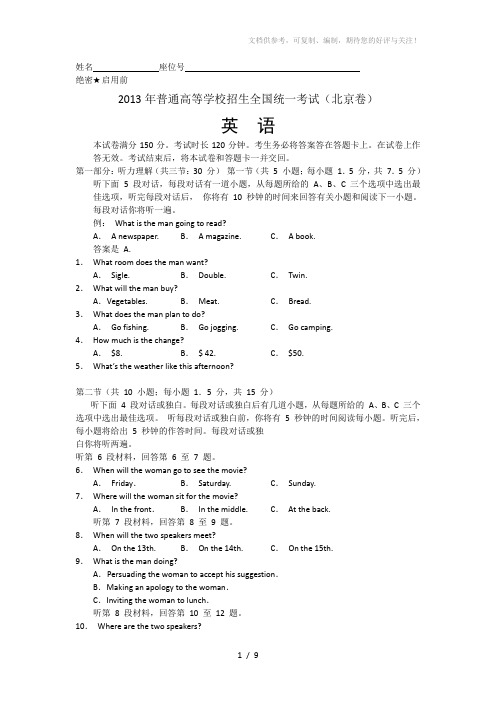
姓名座位号绝密★启用前2013年普通高等学校招生全国统一考试(北京卷)英语本试卷满分150分。
考试时长120分钟。
考生务必将答案答在答题卡上。
在试卷上作答无效。
考试结束后,将本试卷和答题卡一并交回。
第一部分:听力理解(共三节:30 分)第一节(共5 小题;每小题1.5 分,共7.5 分)听下面5 段对话,每段对话有一道小题,从每题所给的A、B、C 三个选项中选出最佳选项,听完每段对话后,你将有10 秒钟的时间来回答有关小题和阅读下一小题。
每段对话你将听一遍。
例:What is the man going to read?A.A newspaper. B.A magazine. C.A book.答案是A.1.What room does the man want?A.Sigle. B.Double. C.Twin.2.What will the man buy?A.Vegetables. B.Meat. C.Bread.3.What does the man plan to do?A.Go fishing. B.Go jogging. C.Go camping.4.How much is the change?A.$8. B.$ 42. C.$50.5.What’s the weather like this afternoon?第二节(共10 小题;每小题1.5 分,共15 分)听下面4 段对话或独白。
每段对话或独白后有几道小题,从每题所给的A、B、C 三个选项中选出最佳选项。
听每段对话或独白前,你将有5 秒钟的时间阅读每小题。
听完后,每小题将给出5 秒钟的作答时间。
每段对话或独白你将听两遍。
听第6 段材料,回答第 6 至7 题。
6.When will the woman go to see the movie?A.Friday.B.Saturday. C.Sunday.7.Where will the woman sit for the movie?A.In the front.B.In the middle. C.At the back.听第7 段材料,回答第8 至9 题。
2013年普通高等学校招生全国统一考试英语试题(北京卷) word版
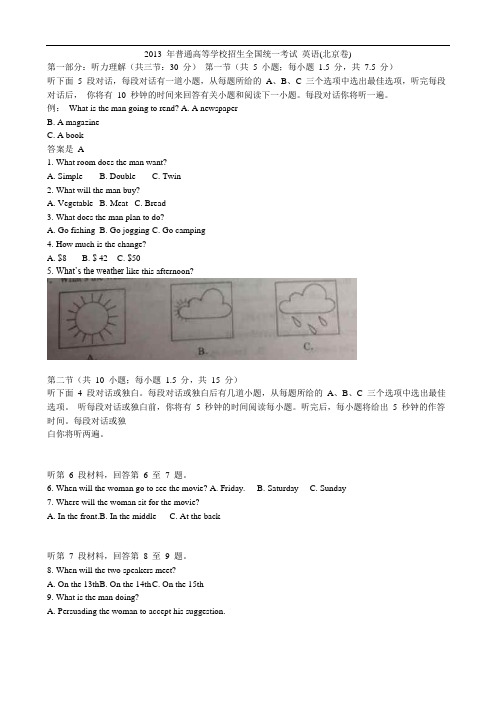
2013 年普通高等学校招生全国统一考试英语(北京卷)第一部分:听力理解(共三节:30 分)第一节(共 5 小题;每小题1.5 分,共7.5 分)听下面5 段对话,每段对话有一道小题,从每题所给的A、B、C 三个选项中选出最佳选项,听完每段对话后,你将有10 秒钟的时间来回答有关小题和阅读下一小题。
每段对话你将听一遍。
例:What is the man going to rend? A. A newspaperB. A magazineC. A book答案是A1. What room does the man want?A. SimpleB. DoubleC. Twin2. What will the man buy?A. VegetableB. MeatC. Bread3. What does the man plan to do?A. Go fishingB. Go joggingC. Go camping4. How much is the change?A. $8B. $ 42C. $505. What’s the weather l ike this afternoon?第二节(共10 小题;每小题 1.5 分,共15 分)听下面4 段对话或独白。
每段对话或独白后有几道小题,从每题所给的A、B、C 三个选项中选出最佳选项。
听每段对话或独白前,你将有5 秒钟的时间阅读每小题。
听完后,每小题将给出5 秒钟的作答时间。
每段对话或独白你将听两遍。
听第 6 段材料,回答第6 至7 题。
6. When will the woman go to see the movie? A. Friday. B. Saturday C. Sunday7. Where will the woman sit for the movie?A. In the front.B. In the middleC. At the back听第7 段材料,回答第8 至9 题。
2013年全国高考(北京卷)英语(含答案)

姓名座位号绝密★启用前2013年普通高等学校招生全国统一考试(北京卷)英语本试卷满分150分。
考试时长120分钟。
考生务必将答案答在答题卡上。
在试卷上作答无效。
考试结束后,将本试卷和答题卡一并交回。
第一部分:听力理解(共三节:30 分)第一节(共5 小题;每小题1.5 分,共7.5 分)听下面5 段对话,每段对话有一道小题,从每题所给的A、B、C 三个选项中选出最佳选项,听完每段对话后,你将有10 秒钟的时间来回答有关小题和阅读下一小题。
每段对话你将听一遍。
例:What is the man going to read?A.A newspaper. B.A magazine. C.A book.答案是A.1.What room does the man want?A.Sigle. B.Double. C.Twin.2.What will the man buy?A.Vegetables. B.Meat. C.Bread.3.What does the man plan to do?A.Go fishing. B.Go jogging. C.Go camping.4.How much is the change?A.$8. B.$ 42. C.$50.5.What’s the weather like this afternoon?第二节(共10 小题;每小题1.5 分,共15 分)听下面4 段对话或独白。
每段对话或独白后有几道小题,从每题所给的A、B、C 三个选项中选出最佳选项。
听每段对话或独白前,你将有 5 秒钟的时间阅读每小题。
听完后,每小题将给出5 秒钟的作答时间。
每段对话或独白你将听两遍。
听第6 段材料,回答第6 至7 题。
6.When will the woman go to see the movie?A.Friday.B.Saturday. C.Sunday.7.Where will the woman sit for the movie?A.In the front.B.In the middle. C.At the back.听第7 段材料,回答第8 至9 题。
2013年普通高等学校招生全国统一考试 英语(北京卷)word版(含答案)
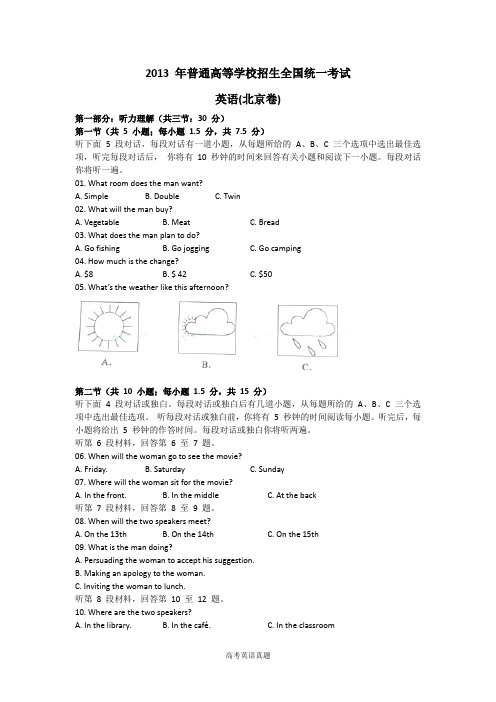
2013 年普通高等学校招生全国统一考试英语(北京卷)第一部分:听力理解(共三节:30 分)第一节(共5 小题;每小题 1.5 分,共7.5 分)听下面 5 段对话,每段对话有一道小题,从每题所给的A、B、C 三个选项中选出最佳选项,听完每段对话后,你将有10 秒钟的时间来回答有关小题和阅读下一小题。
每段对话你将听一遍。
01. What room does the man want?A. SimpleB. DoubleC. Twin02. What will the man buy?A. VegetableB. MeatC. Bread03. What does the man plan to do?A. Go fishingB. Go joggingC. Go camping04. How much is the change?A. $8B. $ 42C. $5005. What’s the weather like this afternoon?第二节(共10 小题;每小题 1.5 分,共15 分)听下面 4 段对话或独白。
每段对话或独白后有几道小题,从每题所给的A、B、C 三个选项中选出最佳选项。
听每段对话或独白前,你将有5 秒钟的时间阅读每小题。
听完后,每小题将给出5 秒钟的作答时间。
每段对话或独白你将听两遍。
听第6 段材料,回答第 6 至7 题。
06. When will the woman go to see the movie?A. Friday.B. SaturdayC. Sunday07. Where will the woman sit for the movie?A. In the front.B. In the middleC. At the back听第7 段材料,回答第8 至9 题。
08. When will the two speakers meet?A. On the 13thB. On the 14thC. On the 15th09. What is the man doing?A. Persuading the woman to accept his suggestion.B. Making an apology to the woman.C. Inviting the woman to lunch.听第8 段材料,回答第10 至12 题。
(完整word版)2013高考英语北京卷试题及其答案解析

2013 年普通高等学校招生全国统一考试英语(北京卷)第二部分:知识运用(共两节,45 分)第一节单项填空(共 15 小题;每小题 1 分,共 15 分)21。
Volunteering gives you a chance_________ lives, including your own。
A。
change B。
changing C. changed D. to change22. Don’t turn off the computer before closing all programs _________ you could have problemsA. or B。
and C. but D。
so23. Shakespeare's play Hamlet _________ into at least ten different films over the past years。
A。
had been made B。
was made C. has been made D. would be made24. _________ the course very difficult, she decided to move to a lower level。
A. Find B。
Finding C。
To find D。
Found25。
-—- Do you think Mom and Dad _________ late? --— No, Swiss Air is usually on time.A. were B。
will be C。
would be D。
have been26. I have an appointment _________ Dr。
Smith, but I need to change it.A. to B。
off C。
with D。
from27。
2013 年普通高等学校招生全国统一考试 英语(北京卷)及参考答案
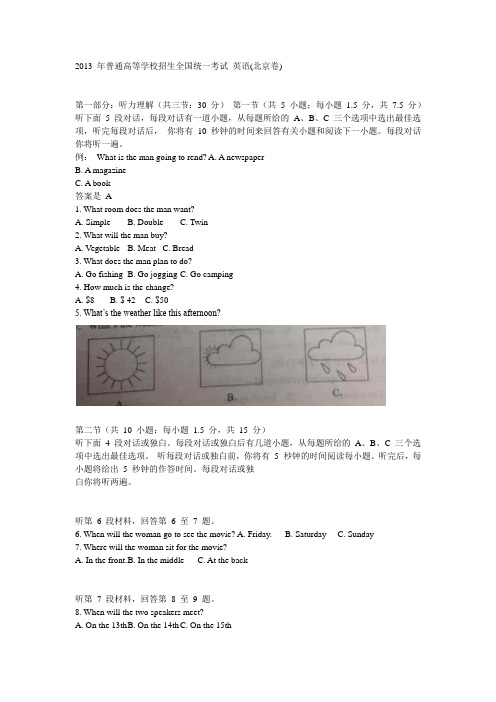
2013 年普通高等学校招生全国统一考试英语(北京卷)第一部分:听力理解(共三节:30 分)第一节(共5 小题;每小题1.5 分,共7.5 分)听下面5 段对话,每段对话有一道小题,从每题所给的A、B、C 三个选项中选出最佳选项,听完每段对话后,你将有10 秒钟的时间来回答有关小题和阅读下一小题。
每段对话你将听一遍。
例:What is the man going to rend? A. A newspaperB. A magazineC. A book答案是A1. What room does the man want?A. SimpleB. DoubleC. Twin2. What will the man buy?A. VegetableB. MeatC. Bread3. What does the man plan to do?A. Go fishingB. Go joggingC. Go camping4. How much is the change?A. $8B. $ 42C. $505. What’s the weather like this afternoon?第二节(共10 小题;每小题1.5 分,共15 分)听下面4 段对话或独白。
每段对话或独白后有几道小题,从每题所给的A、B、C 三个选项中选出最佳选项。
听每段对话或独白前,你将有5 秒钟的时间阅读每小题。
听完后,每小题将给出5 秒钟的作答时间。
每段对话或独白你将听两遍。
听第6 段材料,回答第6 至7 题。
6. When will the woman go to see the movie? A. Friday. B. Saturday C. Sunday7. Where will the woman sit for the movie?A. In the front.B. In the middleC. At the back听第7 段材料,回答第8 至9 题。
2013年北京高考英语试题及答案免费(word版)

第三部分:阅读理解(共两节,20 分)第一节(共 15 小题;每小题 2 分,共 30 分)阅读下列短文:从每题所给的 A、B、C、D 四个选项中,选出最佳选项,将正确的选项涂在答题卡上。
AEP Portable HeaterWe all know that the cost of heating our homes will continue to be a significant burden on the family budget. Now millions of people are saving on their heating bills with the EP Portable Heater. With over one million satisfied customers around the world, the new EP heats better and faster, saves more on heating bills, and runs almost silent.The EP has no exposed heating parts that can cause a fire. The outside of EP only gets warm to the touch so that it will not burn children or pets.The EP will not reduce oxygen in the room. With other heaters, you’ll notice that you get sleepy when the heat comes on because they are burning up oxygen.The advanced EP also heats the room evenly, wall to wall and floor to ceiling. it comfortably covers an area up to 350 square feet. Other heaters heat rooms unevenly with most of the heat concentrated to the center of the room. And they only heat an area a few feet around the heater. With the EP, the temperature will not vary in any part of the room.The EP comes with a 3-year warranty(保修) and a 60-day. no questions asked. Satisfaction guarantee. If you are not totally satisfied, return it to our expertise and your money will be given back to you.Now, we have a special offer for 10 days, during which you can enjoy a half price discount and a free delivery. if you order that, we reserve the right to either accept or reject order requests at the discounted price.Take action right now!BTaIL SpinTwo dolphins race around in a big pool in the Ocean Park. The smaller dolphin Grace, shown off a few of her tricks, turning around and waving hello to the crowd. The most amazing thing about her, however, is that she’s even swimming at all. She doesn’t have a tail.Grace lost her tail as a baby when she got caught up in a fish trap.When the dolphin arrived at the Ocean Park in December 2005, shewas fighting for her life. “Is she going to make it?” Her trainer, Abbey Stone, feared the worst. Grace did make it --- but her tail didn’t. She ended up losing h er flukes and the lower part of her peduncle.Over the past six years, she has learned to swim without her tail. Dolphins swim by moving their flukes and peduncle up and down. Grace taught herself to move another way---like a fish! She pushed herself forward through the water by moving her peduncles from side to side.The movement put harmful pressure on Grace’s backbone. So a company offered to create a man-made tail for her. The tail had to be strong enough to stay on Grace as she swam but soft enough that it wouldn’t hurt her.The first time Grace wore the artificial tail. She soon shook it off and let it sink in the bottom of the pool. Now, she is still learning to use the tail. Some days she wears it for an hour at a time, others not at all. “The tail isn’tnecessary for her to feel comfortable,” says Stone, “but it helps to keep that range of motion(动作) and build muscles(肌肉).”Now, the dolphin is about to get an even happier ending. This month, Grace will star in Dolphin Tale, a film that focus on her rescue and recovery. Her progress has inspired more than just a new movie. Many people travel from near and far to meet her. Seeing Grace swim with her man-made tail gives people so much courage.CDoes Fame Drive You Crazy?Although being famous might sound like a dream come true, today’s star, feeling like zoo animals, face pressures that few of us can imagine. They are at the center of much of the world’s attention. Paparazzi (狗仔队) camp outside their homes, cameras ready. Tabloids (小报) publish thrilling stories about their personal lives. Justimagine not being able to do anything without being photographed or interrupted for a signature. According to psychologist Christina Villareal, celebrities — famous people — worry constantly about their public appearance. Eventually, they start to lose track of who they really are, seeing themselves the way their fans imagine them, not as the people they were before everyone knew their names. “Over time,” Villareal says, “they feel separated and alone.”The phenomenon of tracking celebrities has been around for ages. In the 4th century B.C., painters followedAlexander the Great into battle, hoping to picture his victories for his admirers. When Charles Dickens visitedAmerica in the 19th century, his sold-out readings attracted thousands of fans, leading him to complain (抱怨)about his lack of privacy. Tabloids of the 1920s and 1930s ran articles about film-stars in much the same way that modern tabloids and websites do.Being a public figure today, however, is a lot more difficult than it used to be. Superstars cannot move about without worrying about photographers with modern cameras. When they say something silly or do somethingridiculous, there is always the Internet to spread the news in minutes and keep their “story” alive forever.If fame is so troublesome, why aren’t all celebrities running away from it? The answer is there are still ways to deal with it. Some stars stay calm by surrounding themselves with trusted friends and family or by escaping to remote places away from big cities. They focus not on how famous they are but on what they love to do or whatever made them famous in the first place. Sometimes a few celebrities can get a little justice. Still, even stars who enjoy full justice often complain about how hard their lives are. They are tired of being famous already.DMultitaskingPeople who multitask all the time may be the worst at doing two things at once, a new research suggests. The findings, based on performances and self-evaluation by about 275 college students, indicate that many people multitask not out of a desire to increase productivity, but because they are easily distracted (分心) and can’t focus on one activity. And “those people turn out to be the worst at handling different things,” said David Sanbonmatsu, a psychologist at the University of Utah. Sanbonmatsu and his colleagues gave the students a set of tests and asked them to report how often they multitasked, how good they thought they were at it, and how sensation-seeking (寻求刺激) or imperative (冲动) they were. They then evaluated the participants’ multitasking ability with a tricky mental task that required the students to do simple mathematical calculations while remembering a set of letters. Not surprisingly, the scientists said, most people thought they were better than average at multitasking, and those who thought they were better at it were more likely to report using a cellphone while driving or viewing multiple kinds of media at once. But those who frequently deal with many things at the same time were found to perform the worst at the actual multitasking test. They also were more likely to admit to sensation-seeking and impulsive behavior, which connects with how easily people get bored and distracted.“People multitask not because it’s going to lead to greater productivity, but because they’re distractible, and they get sucked into things that are not as important.” Sanbonmatsu said. Adam Gazzaley, a researcher at the University of California, San Francisco, who was not a member of the research group, said one limitation of the study was that it couldn’t find ou t whether people who start out less focused toward multitasking or whether people’s recognizing and understanding abilities change as a result of multitasking.The findings do suggest, however, why the sensation-seeker who multitask the most may enjoy risky distracted driving. “People who are multitasking are generally less sensitive to risky situations.” said Paul Atchley, another researcher not in the group. “This may partly explain why people go in for these situations even though they’re dangerous.”。
2013北京高考真题英语含答案

绝密★启封并使用完毕前2013年普通高等学校招生全国统一考试英语(北京卷)第一部分听力理解1.(1分)What room does the man want?A.Simple B.Double C.Twin.2.(1分)What will the man buy?A.Vegetable B.Meat C.Bread.3.(1分)What does the man plan to do?A.Go fishing B.Go jogging C.Go camping.4.(1分)How much is the change?A.﹩8 B.﹩42 C.﹩50.5.(1分)What's the weather like this afternoon?6.(2分)听第 6 段材料,回答第6至7题.6.When will the woman go to see the movie?A.Friday.B.Saturday C.Sunday7.Where will the woman sit for the movie?A.In the front. B.In the middle C.At the back.8.(2分)听第 7 段材料,回答第8至9题.8.When will the two speakers meet?A.On the 13th B.On the 14th C.On the 15th9.What is the man doing?A.Persuading the woman to accept his suggestion.B.Making an apology to the woman.C.Inviting the woman to lunch.10.(2分)听第8段材料,回答第10至12题.10.Where are the two speakers?A.In the library.B.In the café.C.In the classroom11.What does the woman like about the summer school?A.The size of the class. B.The math book. C.The teachers.12.Where is the man planning to do?A.Boston B.Washington D.C. C.New York.13.(3分)听第9段材料,回答第13至15题.13.Where does the speaker get information for the trip?A.The internet. B.Travel agents. C.Guidebooks.14.What public transportation does the speaker seldom take?A.Planes. B.Buses. C.Trains.15.What kind of hotels does the speaker usually stay in?A.Hotels with low prices. B.Hotels providing meals. C.Hotels near sightseeing places.16.(5分)听下面一段对话,完成第16至20五道小题,每小题仅填写一个词,听对话前,你将有20秒钟的时间阅读试题,听完后你将有 60 秒钟的作答时间.这段对话你将听两遍.Customer Pick﹣up/Delivery FormPick﹣up△Delivery▲Name (16)SmithAddress Apartment No.23,No.2Front (17)Telephone No.(18)Type& Amount One (19)pizza with mushrooms and extra cheesePrice& Payment £12.50,paid in (20)第二部分:知识运用(共两节,45分)第一节单项填空(共15小题;每小题1分,共15分)从每题所给的ABCD四个选项中,选出可以填入空白处的最佳选项,并在答题卡上将该项涂黑。
2013北京高考英语试题及答案
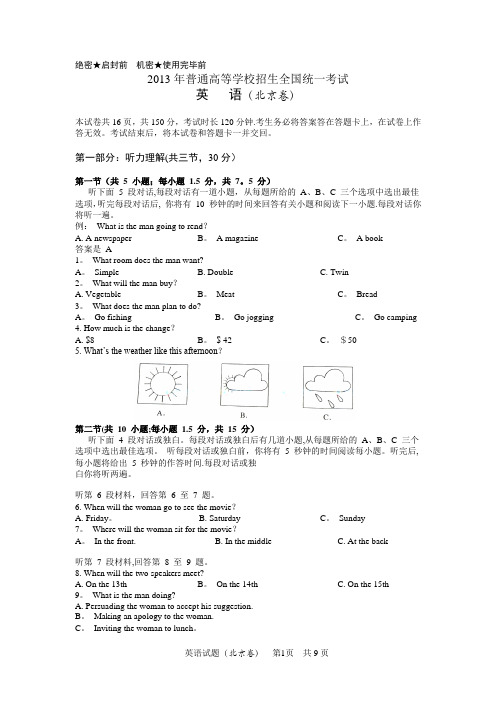
绝密★启封前机密★使用完毕前2013年普通高等学校招生全国统一考试英语(北京卷)本试卷共16页,共150分,考试时长120分钟.考生务必将答案答在答题卡上,在试卷上作答无效。
考试结束后,将本试卷和答题卡一并交回。
第一部分:听力理解(共三节,30分)第一节(共5 小题;每小题 1.5 分,共7。
5 分)听下面5 段对话,每段对话有一道小题,从每题所给的A、B、C 三个选项中选出最佳选项,听完每段对话后, 你将有10 秒钟的时间来回答有关小题和阅读下一小题.每段对话你将听一遍。
例:What is the man going to rend?A. A newspaper B。
A magazine C。
A book答案是A1。
What room does the man want?A。
Simple B. Double C. Twin2。
What will the man buy?A. Vegetable B。
Meat C。
Bread3。
What does the man plan to do?A。
Go fishing B。
Go jogging C。
Go camping4. How much is the change?A. $8 B。
$ 42 C。
$505. What’s the weather like this afternoon?第二节(共10 小题;每小题 1.5 分,共15 分)听下面4 段对话或独白。
每段对话或独白后有几道小题,从每题所给的A、B、C 三个选项中选出最佳选项。
听每段对话或独白前,你将有5 秒钟的时间阅读每小题。
听完后,每小题将给出5 秒钟的作答时间.每段对话或独白你将听两遍。
听第6 段材料,回答第6 至7 题。
6. When will the woman go to see the movie?A. Friday。
B. Saturday C。
Sunday7。
Where will the woman sit for the movie?A。
2013年全国统一考试英语试卷北京卷及答案
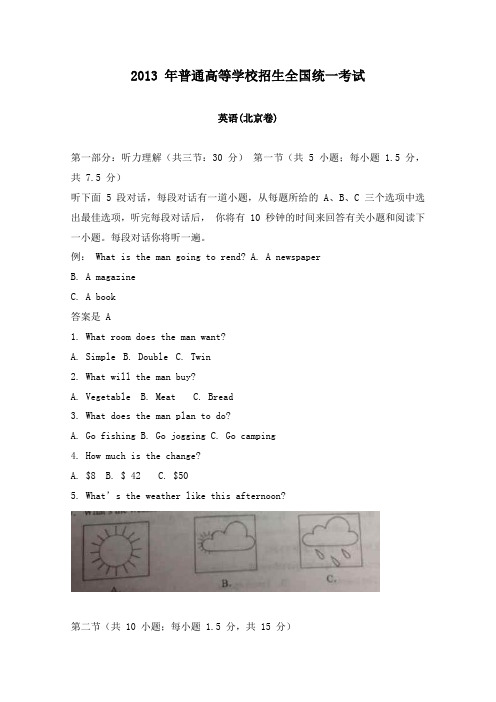
2013 年普通高等学校招生全国统一考试英语(北京卷)第一部分:听力理解(共三节:30 分)第一节(共 5 小题;每小题 1.5 分,共 7.5 分)听下面 5 段对话,每段对话有一道小题,从每题所给的 A、B、C 三个选项中选出最佳选项,听完每段对话后,你将有 10 秒钟的时间来回答有关小题和阅读下一小题。
每段对话你将听一遍。
例: What is the man going to rend? A. A newspaperB. A magazineC. A book答案是 A1. What room does the man want?A. SimpleB. DoubleC. Twin2. What will the man buy?A. VegetableB. MeatC. Bread3. What does the man plan to do?A. Go fishingB. Go joggingC. Go camping4. How much is the change?A. $8B. $ 42C. $505. What’s the weather like this afternoon?第二节(共 10 小题;每小题 1.5 分,共 15 分)听下面 4 段对话或独白。
每段对话或独白后有几道小题,从每题所给的 A、B、C 三个选项中选出最佳选项。
听每段对话或独白前,你将有 5 秒钟的时间阅读每小题。
听完后,每小题将给出 5 秒钟的作答时间。
每段对话或独白你将听两遍。
听第 6 段材料,回答第 6 至 7 题。
6. When will the woman go to see the movie? A. Friday. B. SaturdayC. Sunday7. Where will the woman sit for the movie?A. In the front.B. In the middleC. At the back听第 7 段材料,回答第 8 至 9 题。
2013年高考英语真题[word校对版]北京卷(英语)(含答案)
![2013年高考英语真题[word校对版]北京卷(英语)(含答案)](https://img.taocdn.com/s3/m/8feadbf1f01dc281e53af0d1.png)
2013 年普通高等学校招生全国统一考试(北京卷)英语第一部分:听力理解(共三节:30 分)第一节(共5 小题;每小题 1.5 分,共7.5 分)听下面 5 段对话,每段对话有一道小题,从每题所给的A、B、C 三个选项中选出最佳选项,听完每段对话后,你将有10 秒钟的时间来回答有关小题和阅读下一小题。
每段对话你将听一遍。
例:What is the man going to rend?A. A newspaperB. A magazineC. A book答案是A1. What room does the man want?A. SimpleB. DoubleC. Twin2. What will the man buy?A. VegetableB. MeatC. Bread3. What does the man plan to do?A. Go fishingB. Go joggingC. Go camping4. How much is the change?A. $8B. $ 42C. $505. What’s the weathe r like this afternoon?第二节(共10 小题;每小题 1.5 分,共15 分)听下面 4 段对话或独白。
每段对话或独白后有几道小题,从每题所给的A、B、C 三个选项中选出最佳选项。
听每段对话或独白前,你将有 5 秒钟的时间阅读每小题。
听完后,每小题将给出 5 秒钟的作答时间。
每段对话或独白你将听两遍。
听第 6 段材料,回答第6 至7 题。
6. When will the woman go to see the movie?A. Friday.B. SaturdayC. Sunday7. Where will the woman sit for the movie?A. In the front.B.In the middleC. At the back听第7 段材料,回答第8 至9 题。
2013 年普通高等学校招生全国统一考试 北京卷
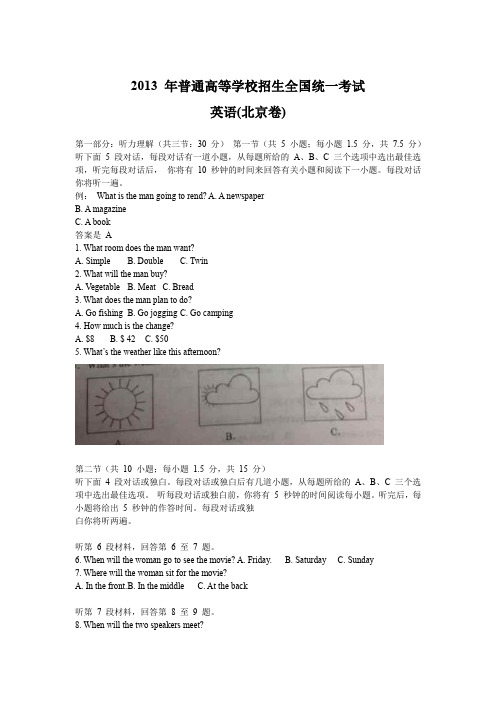
2013 年普通高等学校招生全国统一考试英语(北京卷)第一部分:听力理解(共三节:30 分)第一节(共5 小题;每小题1.5 分,共7.5 分)听下面5 段对话,每段对话有一道小题,从每题所给的A、B、C 三个选项中选出最佳选项,听完每段对话后,你将有10 秒钟的时间来回答有关小题和阅读下一小题。
每段对话你将听一遍。
例:What is the man going to rend? A. A newspaperB. A magazineC. A book答案是A1. What room does the man want?A. SimpleB. DoubleC. Twin2. What will the man buy?A. VegetableB. MeatC. Bread3. What does the man plan to do?A. Go fishingB. Go joggingC. Go camping4. How much is the change?A. $8B. $ 42C. $505. What’s the weathe r like this afternoon?第二节(共10 小题;每小题 1.5 分,共15 分)听下面4 段对话或独白。
每段对话或独白后有几道小题,从每题所给的A、B、C 三个选项中选出最佳选项。
听每段对话或独白前,你将有5 秒钟的时间阅读每小题。
听完后,每小题将给出5 秒钟的作答时间。
每段对话或独白你将听两遍。
听第6 段材料,回答第6 至7 题。
6. When will the woman go to see the movie? A. Friday. B. Saturday C. Sunday7. Where will the woman sit for the movie?A. In the front.B. In the middleC. At the back听第7 段材料,回答第8 至9 题。
2013年全国高考英语试题(含答案)-北京卷
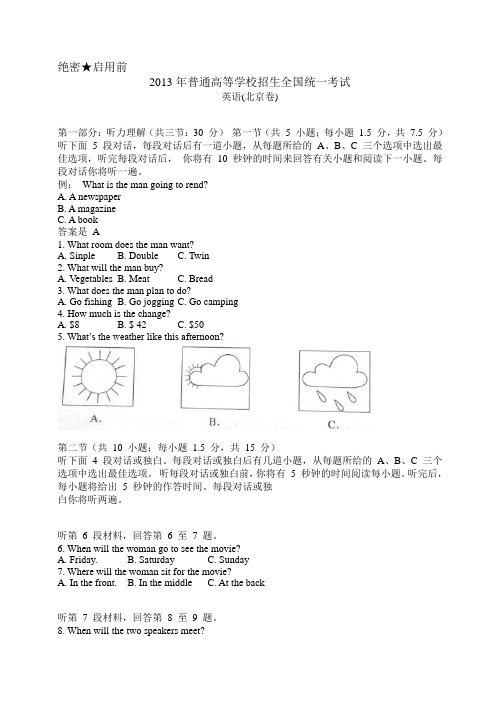
绝密★启用前2013年普通高等学校招生全国统一考试英语(北京卷)第一部分:听力理解(共三节:30 分)第一节(共 5 小题;每小题1.5 分,共7.5 分)听下面5 段对话,每段对话后有一道小题,从每题所给的A、B、C 三个选项中选出最佳选项,听完每段对话后,你将有10 秒钟的时间来回答有关小题和阅读下一小题。
每段对话你将听一遍。
例:What is the man going to rend?A. A newspaperB. A magazineC. A book答案是A1. What room does the man want?A. SinpleB. DoubleC. Twin2. What will the man buy?A. VegetablesB. MeatC. Bread3. What does the man plan to do?A. Go fishingB. Go joggingC. Go camping4. How much is the change?A. $8B. $ 42C. $505. What’s the weather like this afternoon?第二节(共10 小题;每小题 1.5 分,共15 分)听下面4 段对话或独白。
每段对话或独白后有几道小题,从每题所给的A、B、C 三个选项中选出最佳选项。
听每段对话或独白前,你将有 5 秒钟的时间阅读每小题。
听完后,每小题将给出5 秒钟的作答时间。
每段对话或独白你将听两遍。
听第 6 段材料,回答第 6 至7 题。
6. When will the woman go to see the movie?A. Friday.B. SaturdayC. Sunday7. Where will the woman sit for the movie?A. In the front.B. In the middleC. At the back听第7 段材料,回答第8 至9 题。
2013年高考英语试题(北京市)

2013年高考英语试题(北京市)2013 (鍖椾含鍗?30 鍒嗭級?51.5 鍒嗭紝鍏?7.5 鍒嗭級?5A銆丅銆丆涓変釜閫夐」涓?浣犲皢鏈?10 绉掗挓鐨灏嗗惉涓€閬嶃€?渚嬶細What is the man going to rend? A. A newspaper B. A magazine C. A book ?A 1. What room does the man want? A. Simple B. Double C. Twin 2. What will the man buy? A. Vegetable B. Meat C. Bread 3. What does the man plan to do? A. Go fishing B. Go jogging C. Go camping 4. How much is the change? A. $8 B. $ 42 C. $50 5. What鈥檚the weather like this afternoon??10 1.5 鍒嗭紝鍏?15 鍒嗭級闈?4A銆丅銆丆??5 绉掗挓鐨勬椂闂撮槄璇绘瘡灏忛?5 绉掗挓鐨勪綔绛旀椂闂淬€傛瘡娈靛?鐧戒綘灏嗗惉涓ら亶銆?6 娈垫潗鏂欙紝鍥炵瓟绗?6 鑷?7 棰樸€?6. When will the woman go to see the movie? A. Friday. B. Saturday C. Sunday 7. Where will the woman sit for the movie? A. In the front. B. In the middle C. At the back7 娈垫潗鏂欙紝鍥炵瓟绗?8 鑷?9 棰樸€?8. When will the two speakers meet? A. On the 13th B. On the 14th C. On the 15th 9. What is the man doing? A. Persuading the woman to accept his suggestion.B. Making an apology to the woman.C. Inviting the woman to lunch.8 娈垫潗鏂欙紝鍥炵瓟绗?10 鑷?12 棰樸€?10. Where are the two speakers? A. In the library. B. In the caf茅. C. In the classroom 11. What does the woman like about the summer school? A. The size of the class. B. The math book. C. The teachers. 12. Where is the man planning to do? A. Boston B. Washington D.C. C. New York9 娈垫潗鏂欙紝鍥炵瓟绗?13 鑷?15 棰樸€?13. Where does the speaker get information for the trip? A. The internet. B. Travel agents. C. Guidebooks. 14. What public transportation does the speaker seldom take? A. Planes. B. Buses. C. Trains. 15. What kind of hotels does the speaker usually stay in? A. Hotels with low prices. B. Hotels providing meals. C. Hotels near sightseeing places.?5 1.5 鍒嗭紝鍏?7.5 鍒嗭級?16 鑷?20皢鏈?20 绉掗挓鐨勬椂闂撮槄璇昏瘯棰橈紝鍚60ら亶銆?Customer Pick-up/Delivery FormPick-up 鈻?Delivery鈻?Name 16 Smith Address Apartment No. 23, No.2 Front 17 Telephone No. 18 Type& Amount One 19_ pizza with mushrooms and extra cheese Price& Payment 锟?2.50, paid in _2045 鍒嗭級?鍗曢」濉15 1 鍒嗭紝鍏?15 鍒嗭級浠庢瘡棰樻墍缁欑殑ABCD夐」锛屽苟鍦ㄧ瓟棰樺崱涓婂皢璇ラ」娑傞粦銆?渚嬶細It鈥檚so nice to hear from her again. , we last met more than thirty years ago. A. What鈥檚more B. That 鈥檚to say C. In other words D. Believe it or not ?D銆?21. Volunteering gives you a chance lives, including your own. A. change B. changingC. changedD. to change 22. Don鈥檛turn off the computer before closing all programs you could have problems A. or B. and C. but D. so 23. Shakespeare鈥檚play Hamlet into at least ten different films over the past years. A. had been made B. was made C. has been made D. would be made 24. the course very difficult, she decided to move to a lower level. A. Find B. Finding C. To find D. Found 25. --- Do you think Mom and Dad late? --- No, Swiss Air is usually on time. A. were B. will be C. would be D. have been 26. I have an appointment Dr. Smith, but I need to change it.A. toB. offC. withD. from 27. Many countries are now setting up national parks animals and plants can be protected. A. when B. which C. whose D. where 28. Hurry up! Mark and Carl us. A. expect B. are expecting C. have expected D. will expect 29. When we saw the road with snow, we decided to spend the holiday at home. A. block B. to block C. blocking D. blocked 30. I took my driving license with me on holiday, I wanted to hire a car. A. in case B. even if C. ever since D. if only 31. makes the book so extraordinary is the creative imagination of the writer. A. That B. What C. Who D. Which 32. --- So what is the procedure? --- All the applicants before a final decision is made by the authority. A. interview B. are interviewing C. are interviewed D. are being interviewed 33. Experts believe people can waste less food by shopping only when it is necessary. A. why B. where C. that D. what 34. If we a table earlier, we couldn鈥檛be standing here in a queue. A. have booked B. booked C. book D. had booked 35. --- You needn鈥檛take an umbrella. It isn鈥檛going to rain. --- Well, I don鈥檛know. It do. A. might B. need C. would D. should?20 1.5 鍒嗭紝鍏?30 鍒嗭級?鎺屾彙鍏跺ぇ鎰忥紝浠庢瘡棰樻墍缁欑殑A銆丅銆丆銆丏娑傞粦銆?A Leap锛堣烦璺冿級to Honor Leaping on a narrow balance beam锛堝钩琛℃湪锛?is not easy. But Lola Walter, a 13-year-old gymnast, is anexpert at it. To perfect her skills, Lola 36 for four hours a day, five days a week. At the state championships in March, she finished seventh out of 16 girls. That鈥檚especially impressive. 37 she is legally blind, born with a rare condition that causes her eyes to shift constantly. She often sees double and can鈥檛_38 how far away things are. When she was little, her mom 39 that even though she couldn鈥檛see 40 , she was fearless. So her mom signed her up for gymnastics when she was three. She loved the 41 right away and gymnastics became her favorite. Though learning gymnastics has been more 42 for her than for some of her tournaments, she has never quit. She doesn鈥檛let her _43 stop her from doing anything that she wants to. She likes the determination it takes to do the sport. Her biggest 44_ is the balance beam. Because she has double vision, she often sees to beams. She must use her sense of touch to help her during her routine. Sometimes she even closes her eyes. 鈥淵ou have to 45_ your mind that it鈥檒l take you where you want to go.鈥?says Lola. To be a top-level gymnast, one must be brave. The beam is probably the most 46 for anyone because it鈥檚four inches wide. At the state competition, Lola didn 鈥檛fall 47 the beam. In fact, she got an 8.1 out of 10---- her highest score yet. Lola doesn鈥檛want to be 48 differently from the other girls on her team. At the competitions, the judges don鈥檛know about her vision _49 _. She doesn鈥檛tell them, because she doesn鈥檛think they need to know. Her mom is amazed by her _50 attitude. Lola never thinks about 51__. She is presently at level 7 while the highest is level 10 in gymnastics. Her 52 is to reach level 9. She says she wants to be a gymnastics coach to pass down what she鈥檚learned to other kids 53 she grew up. Lola is 54 of all her hard work and success. She says it鈥檚helped her overcome problems in her life outside gymnastics, too. Her 55 for others is 鈥渏ust believe yourself鈥?36. A. runs B. teaches C. trains D. dances 37. A. since B. unless C. after D. though 38.A. tellB. guessC. assumeD. predict 39. A. suspected B remembered C. imagined D.noticed 40. A. deeply B. well C. ahead D. closely 41. A. task B. sport C. event D. show 42. A. boring B. enjoyable C. different D. unsatisfactory 43. A. talent B. quality C. nature D. condition 44. A. doubt B. advantage C. challenge D. program 45. A. examine B. express C. open D. trust 46. A. fearful B. harmful C. unfair D. inconvenient 47. A. to B. on C. off D. against 48. A. greeted B. treated C. served D. paid 49. A. pains B. stresses C. injuries D. problems 50. A. positive B. friendly C. flexible D. caution 51. A. defending B. quitting C. winning D. bargaining 52. A. standard B. range C. view D. goal53. A. until B. as C. when D. before 54. A. proud B. tired C. ashamed D. confident 55.A. planB. adviceC. rewardD. responsibility?锛堝叡涓よ妭锛?0 鍒嗭級?15 2 鍒嗭紝鍏?30 鍒嗭級A銆丅銆丆銆丏鍥涗釜閫夐」涓?A EP Portable Heater We all know that the cost of heating our homes will continue to be a significant burden on the family budget. Now millions of people are saving on their heating bills with the EP Portable Heater. With over one million satisfied customers around the world, the new EP heats better and faster, saves more on heating bills, and runs almost silent. The EP has no exposed heating parts that can cause a fire. The outside of EP only gets warm to the touch so that it will not burn children or pets. The EP will not reduce oxygen in the room. With other heaters, you鈥檒l notice that you get sleepy when the heat comes on because they are burning up oxygen. The advanced EP also heats the room evenly, wall to wall and floor to ceiling. it comfortably covers an area up to 350 square feet. Other heaters heat rooms unevenly with most of the heat concentrated to the center of the room. And they only heat an area a few feet around the heater. With the EP, the temperature will not vary in any part of the room. The EP comes with a 3-year warranty(淇濅慨) and a60-day. no questions asked. Satisfaction guarantee. If you are not totally satisfied, return it to our expertise and your money will be given back to you. Now, we have a special offer for 10 days, during which you can enjoy a half price discount and a free delivery. if you order that, we reserve the right to either accept or reject order requests at the discounted price. Take action right now!56. What is mainly discussed in paragraph 2? A. the heat of the EP B. the safety of the EP C. the appearance of the EP D. the material of the EP 57. From the passage, we can learn that the EP . A. doesn鈥檛burn up oxygen B. runs without any noise C. makes people get sleepy D. is unsuitable for children and pets 58. The underlined word 鈥渆venly鈥?in paragraph 4 probably means . A. continuously B. separately C. quickly D. equally 59. The main purpose of the passage is to . A. persuade people to buy the product B. advise people to save on heating bills C. report the new development of portable heaters D. compare the difference of different heart brands B TaIL Spin Two dolphins race around in a big pool in the Ocean Park. The smaller dolphin Grace, shown off a few of her tricks, turning around and waving hello to the crowd. The most amazing thing about her, however, is that she鈥檚even swimming at all. She doesn鈥檛have a tail. Grace lost her tail as a baby when she got caught up in a fish trap. When the dolphin arrived at the Ocean Park in December 2005, she was fighting for her life. 鈥淚s she going to make it?鈥?Her trainer, Abbey Stone, feared the worst. Grace did make it --- but her tail didn鈥檛. She ended up losing her flukes and the lower part of her peduncle. Over the past six years, she has learned to swim without her tail. Dolphins swim by moving their flukes and peduncle up and down. Grace taught herself to move another way---like a fish! She pushed herself forward through the water by moving her peduncles from side to side. The movement put harmful pressure on Grace鈥檚backbone. So a company offered to create a man-made tail for her. The tail had to be strong enough to stay on Grace as she swam but soft enough that it wouldn鈥檛hurt her. The first time Grace worethe artificial tail. She soon shook it off and let it sink in the bottom of the pool. Now, she is still learning to use the tail. Some days she wears it for an hour at a time, others not at all. 鈥淭he tail isn鈥檛necessary for her to feel comfortable,鈥?says Stone, 鈥渂ut it helps to keep that range of motion(鍔ㄤ綔) and build muscles(鑲岃倝).鈥?Now, the dolphin is about to get an even happier ending. This month, Grace will star in Dolphin Tale, a film that focus on her rescue and recovery. Her progress has inspired more than just a new movie. Many people travel from near and far to meet her. Seeing Grace swim with her man-made tail gives people so much courage.60. When Grace first arrived at the Ocean Park, her trainer worried about her . A. physical build B. potential ability C. chance of survival D. adaptation to the surroundings. 61. A man-made tail is created for Grace to _. A. let her recover faster B. make her comfortable C. adjust her way of swimming D. help her perform better tricks 62. The story of Grace inspires people to_ . A. stick to their dreams B. treat animals friendly C. treasure what they have D. face difficulties bravelyC Does Fame Drive You Crazy? Although being famous might sound like a dream come true, today鈥檚star, feeling like zoo animals, face pressures that few of us can imagine. They are at the center of much of the world鈥檚attention. Paparazzi (鐙椾粩闃? camp outside their homes, cameras ready. Tabloids (灏忔姤) publish thrilling stories about their personal lives. Just imagine not being able to do anything without being photographed or interrupted for a signature. According to psychologist Christina Villareal, celebrities 鈥?famous people 鈥?worry constantly about their public appearance. Eventually, they start to lose track of who they really are, seeing themselves the way their fans imagine them, not as the people they were before everyone knew their names. 鈥淥ver time,鈥?Villareal says, 鈥渢hey feel separated and alone.鈥?The phenomenon of tracking celebrities has been around for ages. In the 4th century B.C., painters followed Alexander the Great into battle, hoping to picture his victories for his admirers. When Charles Dickens visited Americain the 19th century, his sold-out readings attracted thousands of fans, leading him to complain (鎶辨€? about his lack of privacy. Tabloids of the 1920s and 1930s ran articles about film-stars in much the same way that modern tabloids and websites do. Being a public figure today, however, is a lot more difficult than it used to be. Superstars cannot move about without worrying about photographers with modern cameras. When they say something silly or do something ridiculous, there is always the Internet to spread the news in minutes and keep their 鈥渟tory鈥?alive forever. If fame is so troublesome, why aren鈥檛all celebrities running away from it? The answer is there are still ways to deal with it. Some stars stay calm by surrounding themselves with trusted friends and family or by escaping to remote places away from big cities. They focus not on how famous they are but on what they love to do or whatever made them famous in the first place. Sometimes a few celebrities can get a little justice. Still, even stars who enjoy full justice often complain about how hard their lives are. They are tired of being famous already. 63. It can be learned from the passage that stars today . A. are often misunderstood by the public B. can no longer have their privacy protected C. spend too much on their public appearance D. care little about how they have come into fame 64. What is the main idea of Paragraph 3? A. Great heroes of the past were generally admired. B. The problem faced by celebrities has a long history. C. Well-known actors are usually targets of tabloids. D. Works of popular writers often have a lot of readers. 65. What makes it much harder to be a celebrity today? A. Availability of modern media. B. Inadequate social recognition. C. Lack of favorable chances. D. Huge population of fans. 66. What is the author鈥檚attitude toward modern celebrity? A. Sincere. B. Sceptical. C. Disapproving. D. Sympathetic.D Multitasking People who multitask all the time may be the worst at doing two things at once, a new research suggests. The findings, based on performances and self-evaluation by about 275 college students, indicate that many people multitasknot out of a desire to increase productivity, but because they are easily distracted (鍒嗗績) and can鈥檛focus on one activity. And 鈥渢hose people turn out to be the worst at handling different things,鈥?said David Sanbonmatsu, a psychologist at the University of Utah. Sanbonmatsu and his colleagues gave the students a set of tests and asked them to report how often they multitasked, how good they thought they were at it, and how sensation-seeking (瀵绘眰鍒烘縺) or imperative (鍐插姩) they were. They then evaluated the participants鈥?multitasking ability with a tricky mental task that required the students to do simple mathematical calculations while remembering a set of letters. Not surprisingly, the scientists said, most people thought they were better than average at multitasking, and those who thought they were better at it were more likely to report using a cellphone while driving or viewing multiple kinds of media at once. But those who frequently deal with many things at the same time were found to perform the worst at the actual multitasking test. They also were more likely to admit to sensation-seeking and impulsive behavior, which connects with how easily people get bored and distracted. 鈥淧eople multitask not because it鈥檚going to lead to greater productivity, but because they鈥檙e distractible, and they get sucked into things that are not as important.鈥?Sanbonmatsu said. Adam Gazzaley, a researcher at the University of California, San Francisco, who was not a member of the research group, said one limitation of the study was that it couldn鈥檛find out whether people who start out less focused toward multitasking or whether people鈥檚recognizing and understanding abilities change as a result of multitasking. The findings do suggest, however, why the sensation-seeker who multitask the most may enjoy risky distracted driving. 鈥淧eople who are multitasking are generally less sensitive to risky situations.鈥?said Paul Atchley, another researcher not in the group. 鈥淭his may partly explain why people go in for these situations even though they鈥檙e dangerous.鈥?67. The research led by Sanbonmatsu indicates that people who multitask . A. seek highproductivity constantly B. prefer handling different things when getting bored C. are more focused when doing many things at a time D. have the poorest results in doing various things at the same time 68. When Sanbonmatsu and his colleagues conducted their research, they . A. assessed the multitasking ability of the students B. evaluated the academic achievements of the students C. analyzed the effects of the participants鈥?tricky mental tasks D. measured the changes of the students鈥?understanding ability 69. According to Sanbonmatsu, people multitask because of their _. A. limited power in calculation B. interests in doing things differently C. inability to concentrate on one task D. impulsive desire to try new things 70. From the last paragraph, we can learn that multitaskers usually . A. drive very skillfully B. go in for different tasks C. fail to react quickly to potential dangers D. refuse to explain the reasons for their behavior?5 2 鍒嗐€傚叡10 鍒嗭級?Urbanization Until relatively recently, the vast majority of human beings lived and died without ever seeing a city. The first city was probably founded no more than 5,500 years ago. 71_ . In fact, nearly everyone lived on farms or in tiny rural (涔℃潙鐨? villages. It was not until the 20th century that Great Britain became the first urban society in history--- a society in which the majority of people live in cities and do not farm for a living. Britain was only the beginning. 72_ .The process of urbanization--- the migration (杩佺Щ) of people from the countryside to the city--- was the result of modernization, which has rapidly transformed how people live and where they live. In 1990, fewer than 40% of Americans lived in urban areas. Today, over 82% of Americans live in cities. Only about 2% live on farms. 73 . Large cities were impossible until agriculture became industrialized. Even in advanced agricultural societies. It took aboutninety-five people on farms to feed five people in cities. _74 . Until modern times,精品试题资料those living in cities were mainly the ruling elite(绮捐嫳) and the servants, laborers and professionals who served them. Cities survived by taxing farmers and were limited in size by the amount of surplus food that the rural population produced and by the ability to move this surplus from farm to city.Over the past two centuries, the Industrial Revolution has broken this balance between the city and the country. 75_ . Today, instead of needing ninety-five farmers to feed five city people, one American farmer is able to feed more than a hundred non-farmers.A. That kept cities very small.B. The rest live in small towns.C. The effects of urban living on people should be considered.D. Soon many other industrial nations become urban societies.E. But even 200 years ago, only a few people could live in cities.F. Modernization drew people to the cities and made farmers more productive.G. Modern cities have destroyed social relations and the health of human beings.15 鍒嗭級?鎯呮櫙浣滄枃锛?0 鍒嗭級?庯紝璇锋寜鐓т互涓嬪洓骞呭浘鐨勫厛鍚庨『搴忥紝鐢ㄨ嫳鏂囧啓涓€绡囧懆璁ч【濂圭殑杩囩▼銆?娉ㄦ剰锛?1. ?2. 璇嶆暟涓嶅皯浜?60.Last Monday,?寮€鏀句綔鏂囷紙15 鍒嗭級囦綔鏂囥€傝瘝鏁颁笉灏戜簬50. You are discussing the following picture with your English friend Jim. Now you are telling him how you understand the picture and what makes you think so.。
2013北京高考英语试题及答案
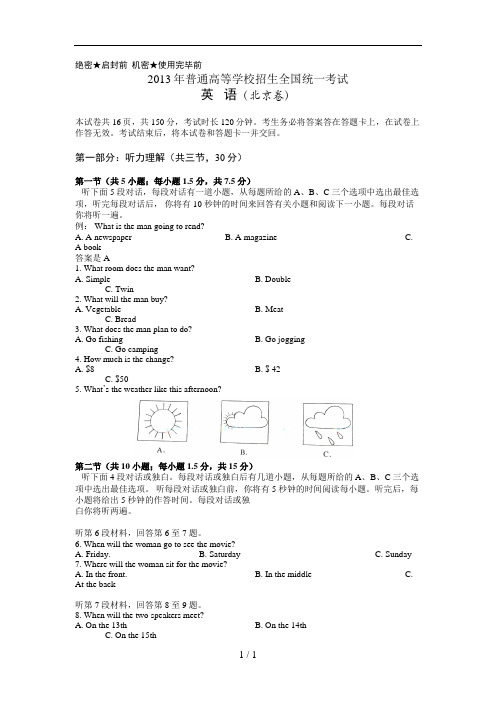
绝密★启封前机密★使用完毕前2013年普通高等学校招生全国统一考试英语(北京卷)本试卷共16页,共150分,考试时长120分钟。
考生务必将答案答在答题卡上,在试卷上作答无效。
考试结束后,将本试卷和答题卡一并交回。
第一部分:听力理解(共三节,30分)第一节(共 5 小题;每小题 1.5 分,共 7.5 分)听下面 5 段对话,每段对话有一道小题,从每题所给的 A、B、C 三个选项中选出最佳选项,听完每段对话后,你将有 10 秒钟的时间来回答有关小题和阅读下一小题。
每段对话你将听一遍。
例: What is the man going to rend?A. A newspaperB. A magazineC.A book答案是 A1. What room does the man want?A. SimpleB. DoubleC. Twin2. What will the man buy?A. VegetableB. MeatC. Bread3. What does the man plan to do?A. Go fishingB. Go joggingC. Go camping4. How much is the change?A. $8B. $ 42C. $505. What’s the weather like this afternoon?第二节(共 10 小题;每小题 1.5 分,共 15 分)听下面 4 段对话或独白。
每段对话或独白后有几道小题,从每题所给的 A、B、C 三个选项中选出最佳选项。
听每段对话或独白前,你将有 5 秒钟的时间阅读每小题。
听完后,每小题将给出 5 秒钟的作答时间。
每段对话或独白你将听两遍。
听第 6 段材料,回答第 6 至 7 题。
6. When will the woman go to see the movie?A. Friday.B. SaturdayC. Sunday7. Where will the woman sit for the movie?A. In the front.B. In the middleC. At the back听第 7 段材料,回答第 8 至 9 题。
- 1、下载文档前请自行甄别文档内容的完整性,平台不提供额外的编辑、内容补充、找答案等附加服务。
- 2、"仅部分预览"的文档,不可在线预览部分如存在完整性等问题,可反馈申请退款(可完整预览的文档不适用该条件!)。
- 3、如文档侵犯您的权益,请联系客服反馈,我们会尽快为您处理(人工客服工作时间:9:00-18:30)。
2013 年普通高等学校招生全国统一考试英语(北京卷)第一部分:听力理解(共三节:30 分)第一节(共 5 小题;每小题 1.5 分,共7.5 分)听下面 5 段对话,每段对话后有一道小题,从每题所给的A、B、C 三个选项中选出最佳选项,听完每段对话后,你将有10 秒钟的时间来回答有关小题和阅读下一小题。
每段对话你将听一遍。
例:What is the man going to rend?A. A newspaperB. A magazineC. A book答案是A1. What room does the man want?A. SinpleB. DoubleC. Twin2. What will the man buy?A. VegetablesB. MeatC. Bread3. What does the man plan to do?A. Go fishingB. Go joggingC. Go camping4. How much is the change?A. $8B. $ 42C. $505. What’s the weather like this afternoon?第二节(共10 小题;每小题 1.5 分,共15 分)听下面 4 段对话或独白。
每段对话或独白后有几道小题,从每题所给的A、B、C 三个选项中选出最佳选项。
听每段对话或独白前,你将有 5 秒钟的时间阅读每小题。
听完后,每小题将给出 5 秒钟的作答时间。
每段对话或独白你将听两遍。
听第 6 段材料,回答第 6 至7 题。
6. When will the woman go to see the movie?A. Friday.B. SaturdayC. Sunday7. Where will the woman sit for the movie?A. In the front.B. In the middleC. At the back听第7 段材料,回答第8 至9 题。
8. When will the two speakers meet?A. On the 13thB. On the 14thC. On the 15th9. What is the man doing?A. Persuading the woman to accept his suggestion.B. Making an apology to the woman.C. Inviting the woman to lunch.听第8 段材料,回答第10 至12 题。
10. Where are the two speakers?A. In the library.B. In the café.C. In the classroom11. What does the woman like about the summer school?A. The size of the class.B. The math book.C. The teachers.12. Where is the man planning to do?A. BostonB. Washington D.C. C. New York听第9 段材料,回答第13 至15 题。
13. Where does the speaker get information for the trip?A. The internet.B. Travel agents.C. Guidebooks.14. What public transportation does the speaker seldom take?A. Planes.B. Buses.C. Trains.15. What kind of hotels does the speaker usually stay in?A. Hotels with low prices.B. Hotels providing meals.C. Hotels near sightseeing places.第三节(共 5 小题;每小题 1.5 分,共7.5 分)听下面一段对话,完成第16 至20 五道小题,每小题仅填写一个词,听对话前,你将有20 秒钟的时间阅读试题,听完后你将有60 秒钟的作答时间。
这段对话你将听两遍。
Customer Pick-up/Delivery FormPick-up△Delivery▲Name16 SmithAddress Apartment No. 23, No.2 Front 17Telephone No.18Type& Amount One 19_ pizza with mushrooms and extra cheesePrice& Payment£12.50, paid in _20第二部分:知识运用(共两节,45 分)第一节单项填空(共15 小题;每小题 1 分,共15 分)从每题所给的ABCD 四个选项中,选出可以填入空白处的最佳选项,并在答题卡上将该项涂黑。
例:It,s so nice to hear from her again. , we last met more than thirty years ago.A. What’s moreB. That’s to sayC. In other wordsD. Believe it or not答案是D。
21. Volunteering gives you a chance lives, including your own.A. changeB. changingC. changedD. to change22. Don’t turn off the computer before closing all programs you could have problemsA. orB. andC. butD. so23. Shakespeare’s play Hamlet into at least ten different films over the past years.A. had been madeB. was madeC. has been madeD. would be made24. the course very difficult, she decided to move to a lower level.A. FindB. FindingC. To findD. Found25. --- Do you think Mom and Dad late?--- No, Swiss Air is usually on time.A. wereB. will beC. would beD. have been26. I have an appointment Dr. Smith, but I need to change it.A. toB. offC. withD. from27. Many countries are now setting up national parks animals and plants can be protected.A. whenB. whichC. whoseD. where28. Hurry up! Mark and Carl us.A. expectB. are expectingC. have expectedD. will expect29. When we saw the road with snow, we decided to spend the holiday at home.A. blockB. to blockC. blockingD. blocked30. I took my driving license with me on holiday, I wanted to hire a car.A. in caseB. even ifC. ever sinceD. if only31. makes the book so extraordinary is the creative imagination of the writer.A. ThatB. WhatC. WhoD. Which32. --- So what is the procedure?--- All the applicants before a final decision is made by the authority.A. interviewB. are interviewingC. are interviewedD. are being interviewed33. Experts believe people can waste less food by shopping only when it is necessary.A. whyB. whereC. thatD. what34. If we a table earlier, we couldn’t be standing here in a queue.A. have bookedB. bookedC. bookD. had booked35. --- You needn’t take an umbrella. It isn’t going to rain.--- Well, I don’t know. It do.A. mightB. needC. wouldD. should第二节完形填空(共20 小题;每小题 1.5 分,共30 分)阅读下面短文,掌握其大意,从每题所给的A、B、C、D 四个选项中,选出最佳选项,并在答题卡上讲该项涂黑。
A Leap(跳跃)to HonorLeaping on a narrow balance beam(平衡木)is not easy. But Lola Walter, a 13-year-old gymnast, is an expert at it.To perfect her skills, Lola 36 for four hours a day, five days a week. At the state championships in March, she finished seventh out of 16 girls.That’s especially impressive. 37 she is legally blind, born with a rare condition that causes her eyes to shift constantly. She often sees double and can’t _38 how far away things are.When she was little, her mom 39 that even though she couldn’t see 40 , she was fearless. So her mom signed her up for gymnastics when she was three. She loved the 41 right away and gymnastics became her favorite.Though learning gymnastics has been more 42 for her than for some of her tournaments, she has neverquit. She doesn’t let her _43 stop her from doing anything that she wants to.She likes the determination it takes to do the sport. Her biggest 44_ is the balance beam. Because she has double vision, she often sees to beams. She must use her sense of touch to help her during her routine. Sometimes she even closes her eyes. “You have to 45_ your mind that it’ll take you where you want to go.” says Lola.To be a top-level gymnast, one must be brave. The beam is probably the most 46 for anyone because it’s four inches wide. At the state competition, Lola didn’t fall 47 the beam. In fact, she got an 8.1 out of 10---- her highest score yet.Lola doesn’t want to be 48 differently from the other girls on her team. At the competitions, the judges don’t know about her vision _49 _. She doesn’t tell them, because she doesn’t think they need to know. Her mom is amazed by her _50 attitude.Lola never thinks about 51__. She is presently at level 7 while the highest is level 10 in gymnastics. Her 52 is to reach level 9. She says she wants to be a gymnastics coach to pass down what she’s learned to other kids 53 she grew up.Lola is 54 of all her hard work and success. She says it’s helped her overcome problems in her lifeoutside gymnastics, too. Her 55 for others is “just believe yourself”.36. A. runs B. teaches C. trains D. dances37. A. since B. unless C. afterD. though38. A. tell B. guess C. assume D. predict39. A. suspected B rememberedC. imagined D. noticed40. A. deeply B. wellC. ahead D. closely41. A. task B. sport C. event D. show42. A. boring B. enjoyable C. different D. unsatisfactory43. A. talent B. quality C. nature D. condition44. A. doubt B. advantage C. challenge D. program45. A. examine B. express C. open D. trust46. A. fearful B. harmful C. unfair D. inconvenient47. A. to B. on C. off D. against48. A. greeted B. treated C. served D. paid49. A. pains B. stresses C. injuries D. problems50. A. positiveB. friendly C. flexible D. caution51. A. defending B. quitting C. winning D. bargaining52. A. standard B. range C. view D. goal53. A. until B. as C. when D. before54. A. proud B. tiredC. ashamed D. confident55. A. plan B. advice C. reward D. responsibility第三部分:阅读理解(共两节,20 分)第一节(共15 小题;每小题 2 分,共30 分)阅读下列短文:从每题所给的A、B、C、D 四个选项中,选出最佳选项,将正确的选项涂在答题卡上。
